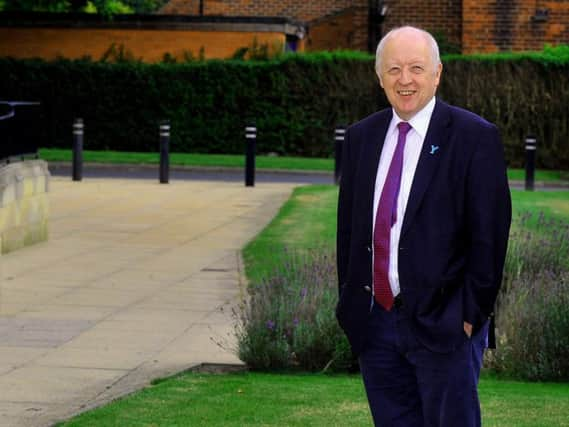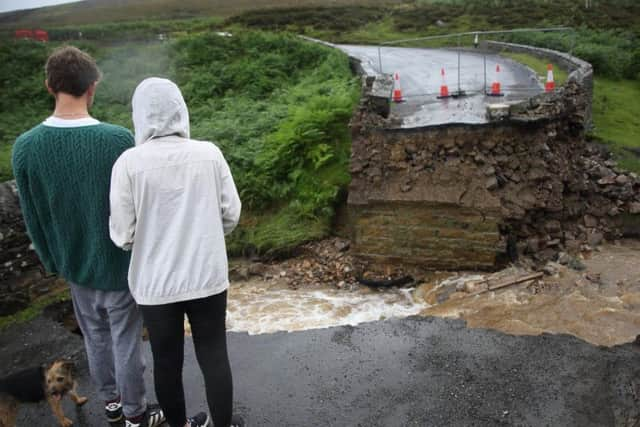My father's remarkable escape from Nazi-occupied Poland helps put Brexit and austerity in perspective, says Yorkshire council leader Carl Les


There was a moment of sober reflection for Carl Les as he took a break from his leader’s role at North Yorkshire County Council to visit the D-Day beaches in France and the site where his father’s Polish regiment fought in the summer of 1944.
Visiting the Grainville-Langannerie Polish war cemetery, 10 miles south of Caen, he was struck by the ages of the soldiers who died fighting alongside his father in the pivotal Second World War battle for Falaise. Many were just 17 or 18 and the oldest was around 30.
Advertisement
Hide AdAdvertisement
Hide AdHis father Stanislaw was a sergeant major in the 1st Armoured Division of the Polish Army which lost hundreds of troops in the battles that eventually opened the way to Paris for the Allied forces. He was one of the lucky ones to make it home and forge a new life in the UK.
“I was reflecting as I was coming back, it is almost a miracle that he survived, and if he hadn’t survived I wouldn’t be here,” he tells The Yorkshire Post during an interview in his office at the county council’s headquarters in Northallerton. “It’s quite sobering.”
Even more extraordinary is the tale, passed on by word of mouth but sadly never committed to paper, of how his father was able to escape Nazi-occupied Poland in 1939 and 1940 and make it to North Yorkshire.


The start of World War Two on September 1, 1939, saw his unit in Poland advance 50 metres before being attacked by the Nazis and captured. Held in a barbed wire pen, the defeated soldiers waited to discover their fate.
Advertisement
Hide AdAdvertisement
Hide Ad“A big German staff car came in, a Mercedes convertible, and a German officer got out in his black leather coat, strutting around the camp looking at all these dejected Poles,” says Coun Les, relating the story.
“His driver was standing round the car, smoking a cigarette so my dad knocked him on the head, jumped in the drivers’ seat, three of his comrades jumped in with him and off they went.”
They drove into Czechoslovakia, then through eastern Europe into Italy and France, selling their stolen car to a doctor who had a Fiat, two spare tyres and two jerry cans of petrol. Eventually reaching the south of France, they were able to persuade the captain of a departing British warship to take them to Britain.
“This was at a time when people were worried about people parachuting into England, dressed as nuns, so everyone was nervous about people who weren’t what they seemed, but somehow this destroyer captain said ‘I’ll take you on board’,” says Coun Les.
Advertisement
Hide AdAdvertisement
Hide AdFor months after his arrival he lived in a tent just off the A74 in Scotland as part of the Polish army in exile, before meeting Coun Les’s mother while visiting an open house run by her maiden aunt just outside Newcastle.
The pair started courting and eventually started the family business in Leeming village, North Yorkshire, renaming Jock’s Cafe as Leeming Cafe in 1948. Arriving in the county he pronounced his surname as Lesh, before eventually changing it to the anglicised Les.
Coun Les reflects that travelling last month to Normandy, where his father and his compatriots in the reformed Polish army fought for the future of their continent, allowed him to put the UK’s current troubles - Brexit, austerity, the ever-present threat of terrorism - into perspective.
“When you think about what people have gone through, 75-80 years ago, these things are significant but it’s not like going through a war, where it is life and death, and if you are defeated you are occupied and that’s it.”
Advertisement
Hide AdAdvertisement
Hide AdInheriting the family business, a service area off the A1, after his parents’ death, Coun Les got into local politics in 1995 when the leader of Hambleton council approached him and asked if he’d consider running. After a successful election he stood for the county council, becoming leader in 2015.
The 70-year-old father-of two’s role at the council has seen him wrestling with the demands of austerity, setting up profit-making companies to plough funds back into services and working on improvements to road and rail infrastructure.
Budget cuts have meant the council has relied much more on volunteers, not least in the county’s libraries which are now volunteer-run with the help of local authority officers.
It was while he was away in France that he became aware of an urgent problem facing North Yorkshire, as parts of the Dales were hit by “unprecedented” rain fall leading to flash floods which destroyed two bridges and badly damaged local roads.
Advertisement
Hide AdAdvertisement
Hide AdReturning on the earliest ferry, he helped coordinate the recovery efforts in Swaledale and Arkengarthdale where farmers buildings have been badly damaged, livestock washed away and farming land silted over.
A lot of the damage is uninsurable, so the county council has written to Environment Secretary Theresa Villiers asking for the Government’s Farming Recovery Fund to be re-opened to help support Dales farmers.
“There has never been such a fall of rain in such a short space of time,” he says. “The impact on the built landscape where drystone walls have been washed away and those stones became almost like missiles as they’ve been going down in the flood water.”
It’s taken a community effort to get the affected areas back on their feet, with local MPs such as Rishi Sunak, recently appointed as Chief Secretary to the Treasury, lobbying for financial support from central government.
Advertisement
Hide AdAdvertisement
Hide AdHe describes how everyone has come together, including the community itself - a matter of pride in a county he says ‘runs on volunteers - and many different parts of the council involved. Highways officers arranged for temporary bridges to be put in place within days while trading standards staff gave advice to avoid vulnerable flood-hit residents being targeted by criminals.
“The county council has been tested but we have stood up to the test very well,” he says. “I am very proud of the people who work for the county council.”